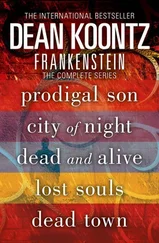No. Not exactly then. Not at the sight of the coin or the detective. He had felt this way at Vanadium's mention of the name that he, Junior, had supposedly spoken in his nightmare.
Bartholomew.
Junior shuddered. Vanadium hadn't invented the name. It had genuine if inexplicable resonance with Junior that had nothing to do with the detective.
Bartholomew.
As before, the name tolled through him like the ominous note of the deepest bass bell in a cathedral carillon, struck on a cold midnight.
Bartholomew.
None of the babies in this creche was named Bartholomew, and Junior struggled to understand what connection this place had to his unrecollected dream.
The full nature of the nightmare continued to elude him, but he became convinced that good reason for his fear existed, that the dream had been more than a dream. He had a nemesis named Bartholomew not merely in dreams, but in the real world, and this Bartholomew had something to do with ... babies.
Drawing from a well of inspiration deeper than instinct, Junior knew that if ever he crossed paths with a man named Bartholomew, he must be prepared to deal with him as aggressively as he had dealt with Naomi. And without delay.
Trembling and sweating, he turned his back to the view window. As he retreated from the creche, he expected the oppressive pall of fear to lift, but it grew heavier.
He found himself looking over his shoulder more than once. By the time lie returned to his room, he felt half crushed by anxiety.
A nurse fussed over him as she helped him into bed, concerned about his paleness and his tremors. She was attentive, efficient, compassionate but she wasn't in the least attractive, and he wished she would leave him alone.
As soon as he was alone, however, Junior yearned for the nurse to return. Alone, he felt vulnerable, threatened.
Somewhere in the world he had a deadly enemy: Bartholomew, who had something to do with babies, a total stranger yet an implacable foe.
If he hadn't been such a rational, stable, no-nonsense person all of his life, Junior might have thought he was losing his mind.
THE SUN ROSE above clouds, above fog, and with the gray day came a silver drizzle. The city was lanced by needles of rain, and filth drained from it, swelling the gutters with a poisonous flood.
St. Mary's social workers did not arrive with dawn, so Celestina was given the privacy of one of their offices, where the wet face of the morning pressed blurrily at the windows, and where she phoned her parents with the terrible news. From here, too, she arranged with a mortician to collect Phimie's body from the cold-storage locker in the hospital morgue, embalm it, and have it flown home to Oregon.
Her mother and father wept bitterly, but Celestina remained composed. She had-much to do, many decisions to make, before she accompanied her sister's body on the flight out of San Francisco. When finally her obligations were met, she would allow herself to feel the loss, the misery against which she was now armored. Phimie deserved dignity in this final journey to her northern grave.
When Celestina had no further calls left to make, Dr. Lipscomb came to her.
He was no longer in his scrubs, but wore gray wool slacks and a blue cashmere sweater over a white shirt. Face somber, he looked less like an obstetrician engaged in the business of life than like a professor of philosophy forever pondering the inevitability of death.
She started to get up from the chair behind the desk, but he encouraged her to stay seated.
He stood at a window, staring down into the street, his profile to her, and in his silence he searched for the words to describe the “something extraordinary” that he had mentioned earlier.
Droplets of rain shimmered on the glass and tracked downward.
Reflections of those tracks appeared as stigmatic tears on the long face of the physician.
When at last he spoke, real grief, quiet but profound, softened his voice: “March first, three years ago, my wife and two sons-Danny and Harry, both seven, twins-were coming home from visiting her parents in New York. Shortly after takeoff ... their plane went down."
Having been so wounded by one death, Celestina could not imagine how Lipscomb could have survived the loss of his entire family. Pity knotted her heart and cinched her throat so that she spoke in little more than a whisper: “Was that the American Airlines. . ."
He nodded.
Mysteriously, on the first day of sunny weather in weeks, the 707 had crashed into Jamaica Bay, Queens, killing everyone aboard. Now, in 1965, it remained the worst commercial-aviation disaster in the nation's history, and because of the unprecedented dramatic television coverage, the story was a permanent scar in Celestina's memory, although she had been living a continent away at the time.
'Miss White,” he continued, still facing the window, “not long before you arrived in surgery this morning, your sister died on the table. We hadn't delivered the baby yet, and perhaps couldn't have done so, by cesarean, in time to prevent brain damage, so for both the sake of the mother and child, heroic efforts were made to bring Phimie back and ensure continued circulation to the fetus until we could extract it."
The sudden change of subject, from the airliner crash to Phimie, confused Celestina.
Lipscomb shifted his gaze from the street below to the source of the rain. “Phimie was not gone long, perhaps a minute-a minute and ten seconds at most-and when she was with us again, it was clear from her condition that the cardiac arrest was most likely secondary to a massive cerebral incident. She was disoriented, paralysis on the right side ... with the distortion of the facial muscles that you saw. Her speech was slurred at first, but then something strange happened. . .
Phimie's speech had been slurred later, as well, immediately following the birth of the baby, when she had struggled to convey her desire to name her daughter Angel.
An affecting but difficult-to-define note in Dr. Lipscomb's voice brought Celestina slowly out of the office chair, to her feet. Perhaps it was wonder. Or fear. Or reverence. Perhaps all three.
For a moment,” Lipscomb continued, “her voice became clear, no longer slurred. She raised her head from the pillow, and her eyes fixed on me, all the confusion gone. She was so ... intense. She said ... she said, 'Rowena loves you.'
A shiver of awe traveled Celestina's spine, because she knew what the physician's next words would surely be.
“Rowena,” he said, confirming her intuition, “was my wife."
As if a door had briefly opened between this windless day and another world, a single gust rattled rain against the windows.
Lipscomb turned to Celestina. “Before lapsing into semicoherence again, your sister said, 'Beezil and Feezil are safe with her,' which may sound less than coherent to you, but not to me."
She waited expectantly.
“Those were Rowena's affectionate names for the boys when they were babies. Her private nonsense names for them, because she said they were like two beautiful little elves and ought to have elfin names."
“Phimie couldn't have known."
“No. Rowena dropped those names after the twins' first year. She and I were the only ones who ever used them. Our private little joke. Even the boys wouldn't have remembered."
In the physician's eyes, a yearning to believe. In his face, a squint of skepticism.
He was a man of medicine and science, who had been served well by hard logic and by an unwavering commitment to reason. He wasn't prepared easily to accept the notion that logic and reason, while essential tools to anyone hoping to lead a full and happy life, were nevertheless sufficient to describe either the physical world or the human experience.
Читать дальше











